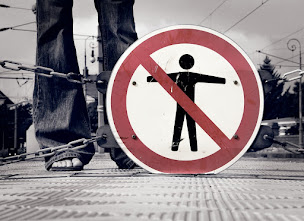Boundaries and Evil Men
Boundaries and Evil Men
Boundaries. It’s a topic that keeps appearing in my life lately. When it comes to personal boundaries, Henry Cloud defines them this way:
“A boundary is a personal property line that marks those things for which we are responsible. In other words, boundaries define who we are and who we are not.”
Boundaries mean knowing how to say, “no,” communicating with others about what is okay and not okay to do to our personal selves, and deciding what gets to come in and go out of our lives. While challenging, boundaries can be super helpful. However I’ve come to a hard realization:
Boundaries do not protect us from pain.
Oh, they can help. But they don’t immunize us from the sting of rejection, the loss when community must be broken with a boundary violator, or the hurt from things that happen beyond the scope of where we can set boundaries.
Because boundaries do not equal control.
I can place boundaries around my choices, but I can’t dictate yours. And if you make lousy ones, it doesn’t stop there from being some effect on me as well.
In the light of this, sometimes I find myself worrying about circumstances beyond my control. I worry about what other people will say or do, what things might happen, and what I’ll need to do in response IF those things happen. People can be scary…
But a passage that’s come to mean more to me is Psalm 37:1-3
“Do not fret because of evildoers, nor be envious of the workers of iniquity. For they shall soon be cut down like the grass, and wither as the green herb. Trust in the Lord, and do good; dwell in the land, and feed on His faithfulness.”
What do I learn from this about dealing with situations outside my control?
1) There will be evil people in your life. Don’t let them stress you out. Or they may not be evil people even – I don’t think the text limits it to that. Evil “doers” could be any of us at different times. We’re all hurt people with the capability of hurting people. People can wrong us. People can do things that aren’t our preference. Things that could make our lives more difficult. But we’re not to let ourselves become distressed over them.
2) Don’t be jealous of them either – they won’t last. In essence, it might seem like they’re prospering and you’re the one with mud on your face. It may not seem fair. But it’s temporary. Don’t stoop to their level.
3) Instead, do two things 1) Trust God, and 2) Do good. (A friend introduced me to an interesting talk by Joyce Meyer on that principle - YouTube: “Choosing to Trust God Sermon 2017). In essence, don’t get caught up in all the other junk and what others are doing. Do what God’s told YOU to do, and trust God with the rest of it.
4) Don’t run.* YOU will dwell in the land. Remember that David was writing this in a time when they constantly had to fight off other nations for their land and their place. In this context, the promise is that God will sustain you in the place that He called you. Don’t let the evil drive you out of it! (*Note: I am not, however, referring to staying in an abusive situation. If it is, that’s not where God’s called you right now. That IS a definite personal boundary violation. And you should go.)
Then in the context of all this, we find one of the most beautiful promises in scripture:
“Delight yourself also in the Lord, and He shall give you the desires of your heart.” – Psalm 37:4
So when I’m stressing about life outside of my control, Lord, thank You for being the ultimate boundary. Help us to trust You, do good, and let You fight the battles we can’t – even the battles for the deep needs of our hearts.


Comments